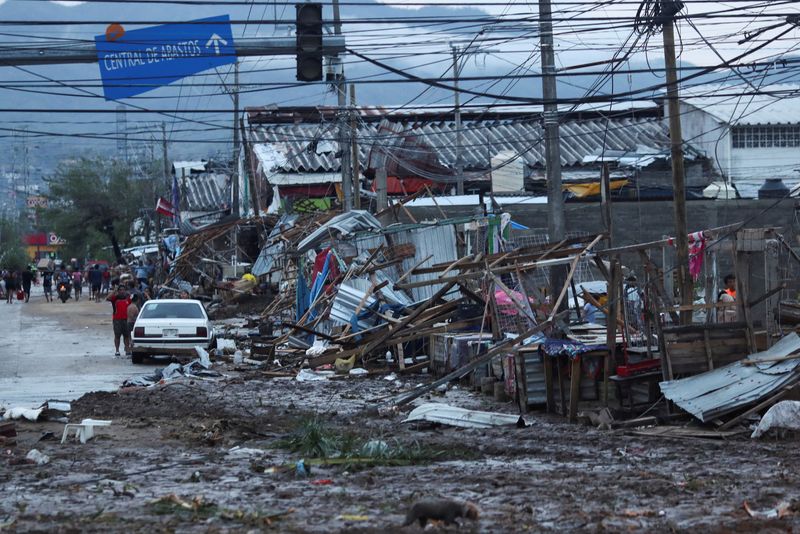By Javier Verdin
ACAPULCO, Mexico (Reuters) -Hurricane Otis, one of the strongest storms ever to hit Mexico's Pacific Coast, roared into the beach resort of Acapulco early on Wednesday, smashing buildings and vital infrastructure and leaving the city incommunicado and without power.
Footage on social media showed hotels wrecked by Otis, ceilings and walls ripped open, windows shattered and cars partly submerged in floodwaters as the rare Category 5 storm barreled ashore in the southern state of Guerrero.
Debris was strewn around lobbies, patios, streets and hotel balconies, and remnants of mangled trees littered downtown Acapulco. Downed telecommunication lines and damage to infrastructure left residents cut off from the outside world.
The airport for the city of nearly 900,000 people was closed until further notice, the transport ministry said, after it lost power and nearby roads were blocked due to Otis.
President Andres Manuel Lopez Obrador set off for Acapulco by car to lend support, but was held up due to road closures caused by the storm, video footage on social media showed.
There were no immediate reports of fatalities, but the power outages made it hard for officials to assess the extent of the destruction. Some officials privately expressed concern that Otis would likely have caused some loss of life.
Luisa Pena, a shaken hotel guest in Acapulco, related how she hid in a closet after being caught in the eye of the storm.
"I literally started to pray," she said in a video on TikTok. "Panic took hold of me to such an extent that all I asked for was just one more chance," she added, saying her room had been "destroyed" as Otis ripped through the building.
Footage from one hospital on social media showed nurses evacuating patients from their rooms to keep them safe from Otis, which strengthened unexpectedly fast at sea and barreled into the coast with winds of 165 miles per hour (266 kph).
The main highway connecting Acapulco to Mexico City would not be fully open until Thursday, the government said as it mobilized the military to help clear up the mess.
Otis reached the shore as a Category 5 - the strongest level on the five-step Saffir-Simpson hurricane wind scale - before quickly weakening to a Category 4 storm. Its power slackened further as it moved inland, reducing Otis to a tropical storm and later dissipating over the mountains of southern Mexico.
Mexican authorities expressed shock at the power of Otis, as the weather front was initially expected only to be a tropical storm. But it quickly grew in strength as it neared the coast.
Otis plowed in to the Pacific coast almost exactly eight years after Hurricane Patricia, a storm that whipped up winds of 200 miles per hour (322 kph).
The U.S. National Hurricane Center warned of heavy rains in southwestern and south-central Mexico through Thursday and a continued risk of lethal flooding and mudslides.
Authorities had previously said Otis could bring up to 20 inches (51 cm) of rain to parts of Guerrero and Oaxaca states, mudslides, a "potentially catastrophic" storm surge, and life-threatening surf and rip current conditions.

Power outages were reported throughout Guerrero, affecting hundreds of thousands, while flights to and from Acapulco were suspended and school classes canceled.
The government said the airport suffered extensive damage, with the hurricane smashing the control tower's windows.
